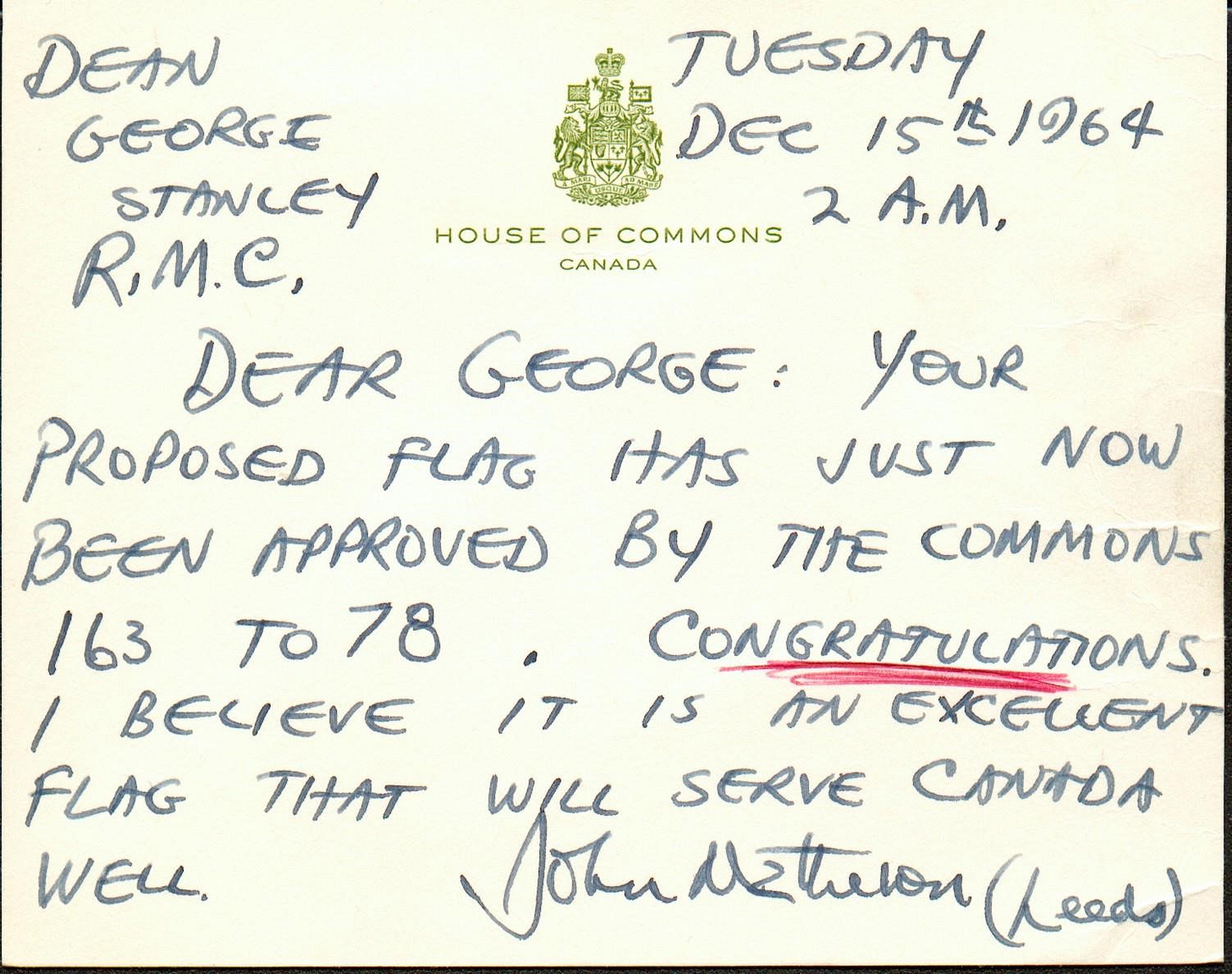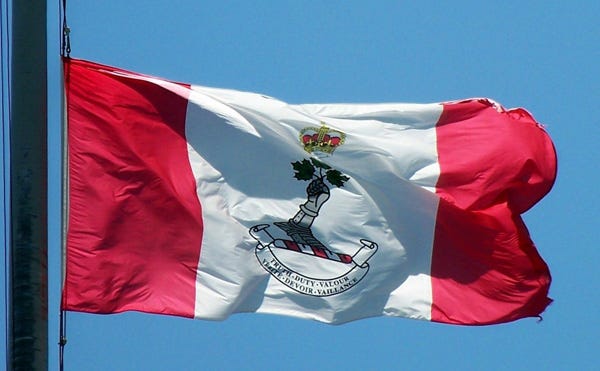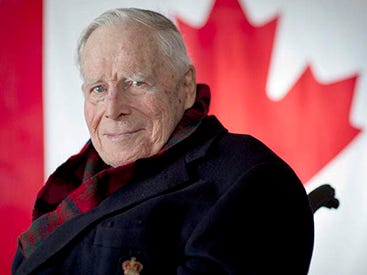At mid-day on February 15, 1965, Canada’s new flag was raised on Parliament Hill for the first time. Exactly two months earlier, in the wee hours of the morning, Parliament approved the iconic red and white maple leaf as our new flag. To mark this momentous occasion, the Member of Parliament who had been tasked with leading the process to create the new flag wrote a quick note to the person who had proposed its design. The note from MP John Matheson was prescient. The flag has served our country well and will continue to be an enduring symbol of liberty, tolerance and opportunity at home and around the world.
The note was sent to the Dean of Arts at the Royal Military College of Canada (RMC) in Kingston because the RMC flag served as the basis for our modern flag. Dr. George Stanley had stood with John Matheson on the parade square of the RMC, pointed to the flag atop the Mackenzie Building (a building named after Canada’s second Prime Minister who founded the college) and said ‘There, John, is your flag’. Stanley’s submission took the red borders astride a white centre and simplified the design down to a single red maple leaf rather than a more complex three-maple leaf sprig atop of an armoured maled fist on the RMC flag. While I would have loved the armoured fist to remain in homage to the resolve Canadians have shown on the battlefield, it was understandable that Stanley toned down the military aspects of the flag. After all, he was our first modern military historian and was well known for his book Canada's Soldiers : The Military History of an Unmilitary People.
The creation of this new symbol was very important at this period in our country’s history. It was meant to show a modern and independent Canada on the world stage as it approached its centennial celebrations in 1967. The idea that a new symbol was needed formed part of Pearson’s campaign promises from 1963 and had already sparked a raucous debate across the country. At one point, Prime Minister Pearson was loudly booed and heckled by Veterans attending the annual convention of the Royal Canadian Legion when he spoke about it. This was going to be a difficult debate about history and identity in a country that always seemed to struggle with both.
Prime Minister Pearson charged MP John Matheson with navigating the choppy waters to create a new Canadian flag for two key reasons. First, he was a congenial Liberal MP from eastern Ontario who was well liked on all sides of the House. He could bring some of the recalcitrant Tories onside or perhaps at least get them to drop the opposition and embrace the new symbol after the vote. But perhaps more importantly, Matheson was chosen because he was a war Veteran who bore the scars of service. He cut quite the figure on Parliament Hill using a cane throughout his post-war life. At first glance, everyone knew that John Matheson was a patriot. A patriot who was also a happy warrior in Parliament made for a very difficult opposition target.
John solicited designs, managed the debate and made the case for this bold move by the government. In the end, closure was needed to end the filibustering and bring the 163-78 vote recounted in the note to Stanley. Matheson had done his job and our country should be forever grateful every February 15th.
I had the great honour of meeting John Matheson several times when I was a cadet at the Royal Military College. The first time I met him was when he spoke at a convocation ceremony and received an honourary degree. The next time was when I volunteered to be his aide for a visit to the college. And a third time was when he just showed up to watch an RMC hockey game. I climbed down from the stands and joined him to watch and chat by the glass. I treasure each of these encounters. He was one of the most inspiring and genuine people I have ever met. A Veteran. A Member of Parliament. A Judge. An early advocate for the disabled. He had done it all and did it with a smile and a positive approach. What I loved the most about our interactions was that he would ask me about my background, why I had joined the military and what I thought about the issues of the day. He was a great Canadian and the father of our flag, yet he was interested in hearing about what this 20 year old kid from Bowmanville thought about the country. He generous spirit was infectious and his wisdom remains available to us today.
John Matheson delivered one of the most eloquent, touching and thoughtful speeches about our country that I have ever heard. Nothing I have heard in a decade in the House of Commons has even come close to the convocation speech Matheson delivered to the RMC Class of 1993. By this point in his life, Matheson needed two canes to go from his wheelchair to the podium, but his smile and charm needed no assistance. On that day, he dedicated his speech to an RMC graduate that none of us had ever heard of. Captain Bob Donald had taken over forward observation officer duties for Matheson after he had been injured the day before. That substitution happened to come as the Battle of Ortona intensified around Casa Berardi. Bob Donald and his Royal Canadian Artillery fought alongside Captain Paul Triquet and his Royal 22e Régiment in some of the most ferocious fighting of the Italian campaign. After the battle, Triquet was awarded the Victoria Cross for his gallant leadership and Bob Donald was dead. Both were courageous Canadian soldiers, yet one had his life cut short when he replaced John Matheson. Fifty years later, Matheson used the platform of recognition he was receiving from the RMC to pay tribute to the memory of his friend.
Bob never wore a medal, never had a wife or child. And I, honoured today, have been blessed with a loving wife, six children and sixteen precious grandchildren. What a husband, parent, citizen this Robert Alexander Donald of RMC would have made had he not perished.
Matheson then recited a small poem that he wrote in tribute to Donald. There was not a dry eye in that humid arena in Kingston thirty years ago. I get emotional just thinking about it today. One life sacrificed so that another could go on and live, love and build a modern nd successful Canada embodied by our flag.
This was a powerful lesson for that graduating class of young officers in 1993, but his speech also has lessons for all Canadians today. Matheson knew that some of the challenges our country faces from our differences can also be sources of some of our greatest strengths. His examples were profound. The story of English Canadian Bob Donald fighting alongside French Canadian Paul Triquet underscored this theme. French and English serving alongside one another while respecting their differences. He recounted how French Canadian prisoners of war at Dieppe had refused chocolate from the Germans when English Canadian prisoners were not offered it as well. He declared that our bilingualism remains one of “the boldest acts of creative statesmanship in Canadian history” and has served as an example to many other nations.
Matheson spoke about gender differences, diversity and working together to serve the community and country in a manner that was astounding for a speech delivered thirty years ago from a Canadian who was already in his 80s. He believed that the Canadian experience of inclusion and interdependence was the greatest of our strengths and an example to the world and the challenges it faced. This is just as true today as it was then.
Think of your country as the laboratory for the emergence of a society of the future where people of diverse origins develop the ultimate social art of interdependent living. Rubbing up against differences creates a kind of enriching redemptive energy.
John Matheson was ahead of his time. What he described as the “redemptive energy” of depending upon one another is something Canadians should reflect upon as we celebrate Flag Day in the aftermath of a pandemic and amid the challenges of war and uncertainty around the world. He was a Veteran who helped give us freedom. He was an MP who helped give us our flag. He was a patriot who also challenged us to put service to Canada first. And in true happy warrior fashion, Matheson ended his speech that day this way: “Be of good cheer and confident that right will finally prevail. Optimism is indeed a form of courage. Faith is greater than doubt and love stronger than hate.”
Thank you John. Vive le Canada!








Thank you so much for sharing this wonderful, most likely forgotten, piece of Canadian history.
Our nation's flag is one of the most beautiful, recognizable in the world.
As I was born in 1967 on June 30, the day before the centennial, I feel a lot of pride and privilege for being a product in this great nation. When I was a young boy growing up, my father always told me that the Canada Day Parade was just for me, which was a bit corky; but it never failed to fill my heart with pride and belonging.
John Matheson was indeed a great Canadian. Thank you for sharing his wonderful speech. Some key excerpts that really struck a chord with me are the following:
- "there is no better way of discovering one's attachment to this country than by absence."
This one means a lot to me. I left Canada in 2008 and came back in 2021. That was a long, 13-year, absence which really opened my eyes about what makes this nation great, what had changed, and what still needs to be healed. The one thing that struct me the most upon my return was the level of hatred and division. I could barely recognize the country I had left so long ago and was greatly saddened by its change of mood.
- "Without truth there can be no other virtue."
- "The truth we seek is greater than any single mind can grasp, amorphous and elusive as the Holy Grael, a prize sought for as long as there is life."
- "Courage is the fibre of the soul enabling it to see the truth and confess it."
- "Faith is greater than doubt and love stronger than hate."
These words of wisdom still resonate with great vibrancy and meaning today, as we face numerous and complex challenges. They serve as kind reminders from our courageous veterans who fought so valiantly to uphold and defend our often-taken-for-granted freedoms.
Let us hope are country will move forward with such values of truth, courage, and faith going forward. And that Canada can serve as a uniter around the globe, lest we forget what it really means to be Canadian and what our fallen fought for.
An outstanding piece. Thank you Erin O'Toole